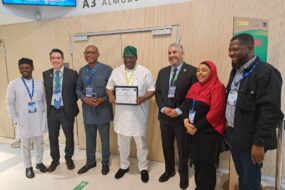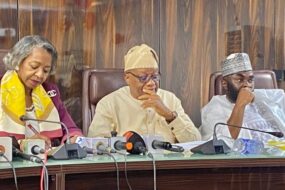
By Balarabe Oshiafi
The Bauchi State Government has officially launched the Digital Literacy (DL4ALL) Bauchi initiative.
Report made available to ExpressDay Newspaper on Friday says this is in partnership with the National Information Technology Department Agency (NITDA).
Declaring the event open, Bauchi State Governor, Senator Bala Mohammed, described digital literacy as a fundamental right of all citizens. He positioned the initiative as part of a broader vision to prepare youth and civil servants to compete globally, create productive jobs, and address poverty through technology.
“Technology and innovation are the fastest-growing industries in the world,” the Governor said. “With the right skills, people can now create sustainable value from anywhere—even from their own homes. This is how we will empower our youth, strengthen institutions, and enable our entrepreneurs to succeed globally. Beyond digital literacy, we are committed to producing an army of experts in advanced digital skills who will drive innovation and economic diversification.”
The Governor emphasised that the ultimate goal is to create productive jobs, “jobs that provide lasting value, fight poverty, and restore dignity.” He noted that over the last six years, the state has invested heavily in infrastructure to open up the economy and connect the vast potential of its youth to global markets.
Speaking on behalf of NITDA’s Director General, Kashifu Inuwa, the Director of the DG’s Office, Dr. Ayodeji Eniola, commended Bauchi State for “taking a bold step towards ensuring the state is not left behind in the ongoing global digital revolution.”
The DL4ALL Bauchi Initiative aligns with NITDA’s Strategic Roadmap and Action Plan 2.0 as well as the National Digital Literacy Framework (NDLF), which focuses on six core competencies: device and software operation, information and data literacy, digital content creation, communication and collaboration, safety, and problem-solving.
The DL4ALL Initiative is anchored on three strategic programs, firstly, the informal sector program which equips artisans, traders, and other informal workers with practical digital skills. In partnership with the National Youth Service Corps, NITDA has recruited and trained 7,101 Digital Literacy Champions who have already reached over 267,000 Nigerians, with a target of 30 million beneficiaries by 2027.
Secondly the workforce readiness program which provide the public servants, graduates, and job seekers with digital productivity and employability skills. NITDA plans to train five million workers nationwide, collaborating with partners such as Cisco and the Office of the Head of Service.
Lastly, the educational sector program which integrates digital literacy into school curricula. A new Basic Education Digital Skills Curriculum, approved in October 2024, will roll out in September 2025, alongside plans to train 3,600 teachers nationwide.
Inuwa further noted that Nigeria’s greatest resource is its young population. “With Bauchi’s abundant human capital and strategic position in northern Nigeria, the state has enormous potential to become a hub for digital innovation and economic transformation,” he said.
He noted that Nigeria’s greatest resource is its young population. “With Bauchi’s abundant human capital and strategic position in northern Nigeria, the state has enormous potential to become a hub for digital innovation and economic transformation,” he said.
















